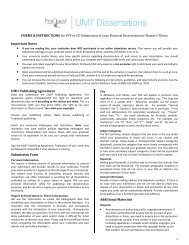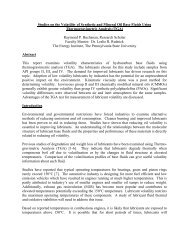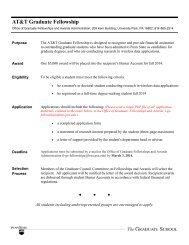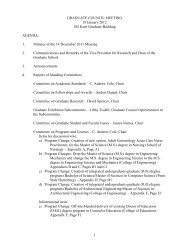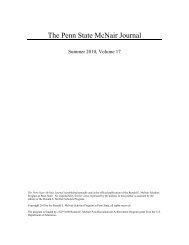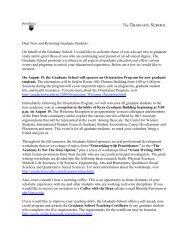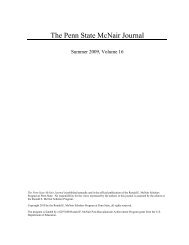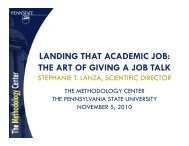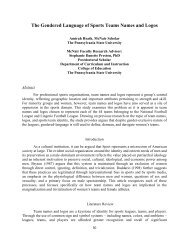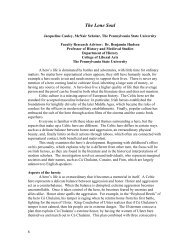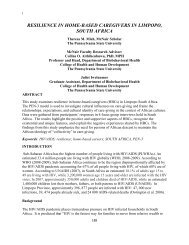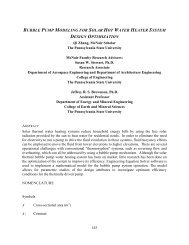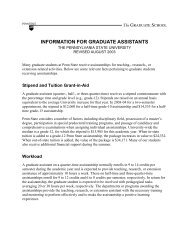1 GRADUATE COUNCIL MEETING 9 May 2012 102 Kern Graduate ...
1 GRADUATE COUNCIL MEETING 9 May 2012 102 Kern Graduate ...
1 GRADUATE COUNCIL MEETING 9 May 2012 102 Kern Graduate ...
Create successful ePaper yourself
Turn your PDF publications into a flip-book with our unique Google optimized e-Paper software.
B7<br />
The membership of doctoral committees should be periodically reviewed by the program chair to<br />
ensure that its members continue to qualify for service on the committee in their designated<br />
roles. For example, if appointments, employment at the University, etc., have changed since<br />
initial appointment to the committee, changes to the committee membership may be necessary. If<br />
changes are warranted, they should be made as soon as possible to prevent future problems that<br />
may delay academic progress for the student (e.g., ability to conduct the comprehensive or final<br />
examinations).<br />
Chair--The chair or at least one co-chair must be a member of the graduate faculty of the<br />
specific doctoral program in which the candidate is enrolled. A retired or emeritus faculty<br />
member may chair a doctoral committee if he/she began chairing the committee prior to<br />
retirement and has the continuing approval of the department head or program chair. The<br />
primary duties of the chair are: (1) to maintain the academic standards of the doctoral program<br />
and the <strong>Graduate</strong> School and assure that all procedures are carried out fairly, (2) to ensure that<br />
the comprehensive and final examinations are conducted in a timely fashion, (3) to arrange and<br />
conduct all meetings, and (4) to ensure that requirements set forth by the committee are<br />
implemented in the final version of the thesis.<br />
Responsibilities of Doctoral Committees--The doctoral committee is responsible for approving<br />
the broad outline of the student’s program and should review the program as soon as possible<br />
after the student’s admission to candidacy. Moreover, continuing communication among the<br />
student, the committee chair, the research supervisor, and the members of the committee is<br />
strongly recommended, to preclude misunderstandings and to develop a collegial relation<br />
between the candidate and the committee.<br />
Doctoral Examination--The (entire) committee will prepare and administer the examination,<br />
and evaluate the candidate’s performance on the examination. If a committee member is unable<br />
to attend the final oral defense, the member may sign as a special signatory. A revised committee<br />
appointment form will need to be sent to the Office of <strong>Graduate</strong> Enrollment Services, 114 <strong>Kern</strong><br />
Building, removing the faculty member as a regular committee member and if it is desired to<br />
designate that individual as a special signatory, a memo must accompany the revised committee<br />
form, requesting that the faculty member be moved to a special signatory. If there are then not<br />
enough members serving on the committee (i.e., four or more active members of the <strong>Graduate</strong><br />
Faculty) another Penn State faculty member will need to replace that member to constitute a<br />
legitimate doctoral committee. (Substitutes are not permitted.) These changes and approvals shall<br />
occur before the actual examination takes place. The department or program head will notify the<br />
Office of <strong>Graduate</strong> Enrollment Services, providing two weeks' notice, when the candidate is<br />
ready to schedule the comprehensive and the final oral examinations and will report the results of<br />
these examinations to that office.”



